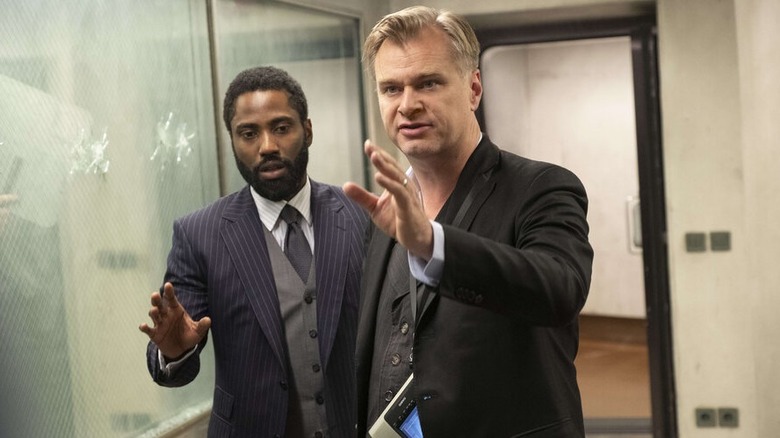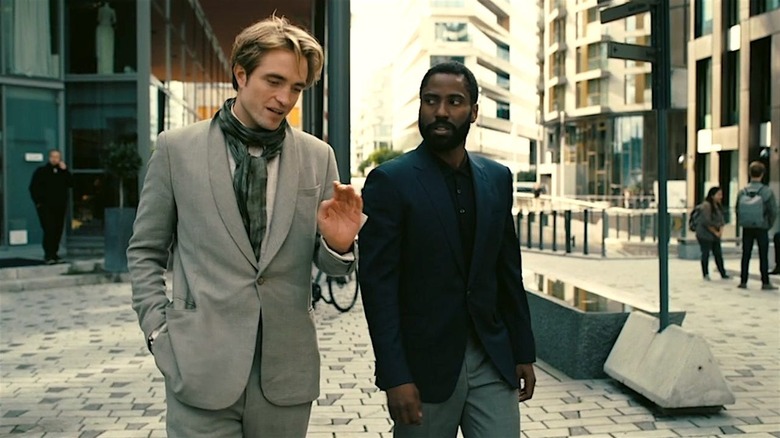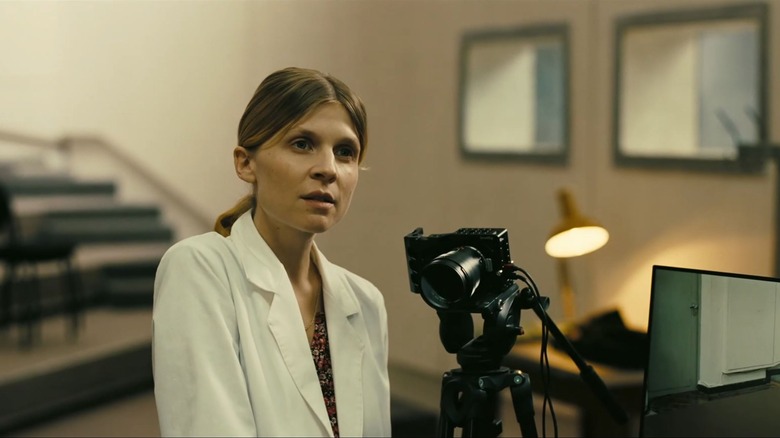Christopher Nolan Thinks You're Missing The Point Of Tenet
I think the film critics of the 2000s and 2010s misdiagnosed what kind of filmmaker Christopher Nolan is.
Back in 2010, in the wake of "Inception," The Guardian asked, "Is Christopher Nolan the new Stanley Kubrick?" The director of "2001," "The Shining," and more, Kubrick's masterpieces are the work of a cynical perfectionist. Nolan has been accused of being cold — it doesn't help he's a British gentleman (England was the Manhattan-born Kubrick's adopted homeland) — and his films' layer cake story structures might feel akin to the ambiguity of Kubrick. Nolan admits he is a fan of Kubrick ("Interstellar" does not exist in the world where Nolan isn't inspired by "2001" as a child). Still, to me at least, it's clear that Nolan is more like Steven Spielberg — a populist auteur.
Nolan makes movies that play for a crowd. That's what "The Prestige" is all about, using Victorian-era stage magic as an allegory for how filmmakers dazzle a willingly deceived audience with illusions. "Dunkirk" ends with a triumphant reminder of the coming Allied victory in World War II. If you aren't biting your nails during the recreation of the Trinity atomic test in "Oppenheimer," you've got sturdier nerves than mine.
If you don't believe me, ask Nolan. The man loves junky blockbusters like James Bond and Michael Bay movies. As he confirmed in a recent appearance on "The Late Show with Stephen Colbert," he's also part of the "Fast & Furious" family ("[For someone unfamiliar], I would start with 'Tokyo Drift'").
In that same interview, Nolan discussed how people getting the wrong idea from his work affected the reception of 2020's "Tenet."
Tenet is not a puzzle
"Tenet" is about The Protagonist (John David Washington), a CIA agent caught in a super-villainous plot to destroy the world with time-manipulating "Inversion" technology. Due to these toys, several action scenes in "Tenet" are replays of ones we've previously seen — but played in reverse (that's why the title is a palindrome). I won't try to explain "Tenet" beyond this, especially since I've only watched it in full once, but according to Nolan, maybe I don't need to say more.
Colbert asked Nolan, "Do your films have meaning or being? In other words, do I have to get your films or can I experience your films?" Nolan answered:
"If you experience my film, you are getting it and I feel very strongly about that. I think where people encounter frustrations with my narratives in the past, sometimes I think they're slightly missing the point. It's not a puzzle to be unpacked, it's an experience to be had — preferably in a movie theater but also at home. [...] For me it's really all about that emotional experience of watching a film with an audience."
Colbert followed up by asking about "Tenet," how it baffled viewers, and if Nolan himself understands "everything" in the movie. Nolan replied: "You're not meant to understand everything in 'Tenet.' It's not all comprehensible. It's a bit like asking if I know what happens to the spinning top at the end of 'Inception' [...] I have to have my idea of it for it to be a valid, productive ambiguity, but the point of it is that it's an ambiguity."
If a film makes you think, you should recognize that's only because of how it made you feel and care. You don't waste time or headspace thinking long and hard about something that sparked indifference, right?
'Don't try to understand it'
Nolan tips his hand against the puzzle-box movie-watching style in "Tenet." During the first big exposition scene, a scientist (Clémence Poésy) equips the Protagonist with a gun that uses "inverted" bullets. When he's still confused after she explains the mechanics, she tells him: "Don't try to understand it — feel it."
This line holds the most obvious meaning in the movie; it's Nolan telling the viewer to just enjoy the thrill ride of the movie they're watching without worrying about how it all fits together. It stands out all the more because Nolan usually loves explaining things; "The Dark Knight Trilogy" details Batman's gadgets just as "The Prestige" does the special effects of stage magic.
Nolan's sentiments of experiencing, not solving, his movies echo those of David Lynch, who typically refuses to engage with any theories explaining his silver screen surrealism. Trying to find the point is missing the point.
Nolan loves action blockbusters because game recognizes game. Yes, he's absolutely a more thoughtful storyteller than Michael Bay or Vin Diesel (and too much of a bleeding heart to be a Kubrick clone). Still, even when his movies have big ideas baked in, he's out to entertain his audience, not confound them.
Not that there's anything wrong with this. Cinema needs its showmen and Nolan is the best one working.


